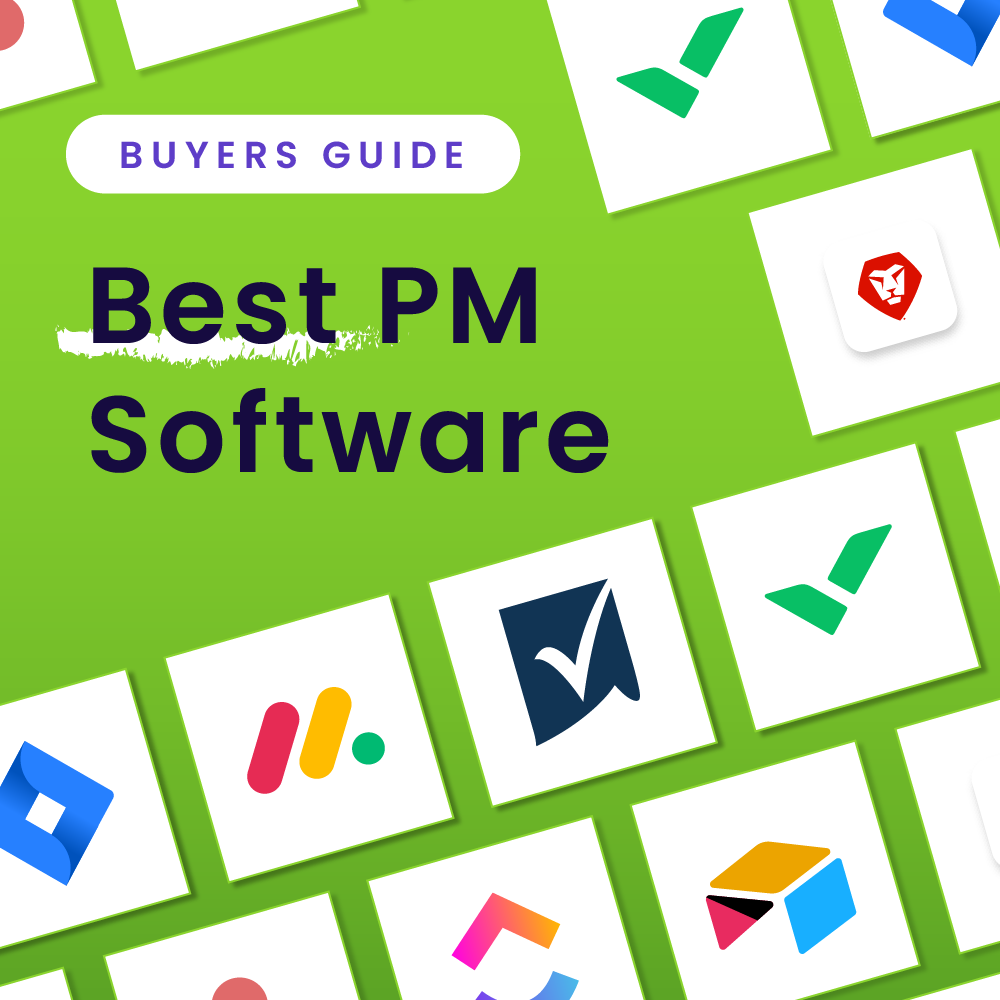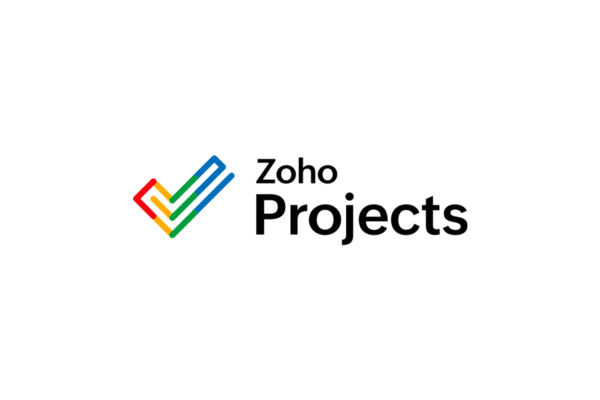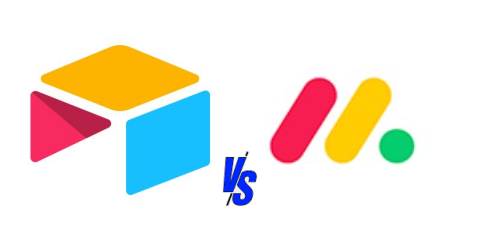We’ve crafted the definitive buyer’s guide for project management tools for startups, encompassing an exploration of leading project management systems in the market.
Need a solution fast? Here are our selections for the best project management software offerings available. These picks are impartial choices from project-management.com, grounded in the diligent research and practical insights of our team.
| Our Picks | Best For | Pricing Starts At |
|---|---|---|
 Visit ClickUp | Best All-in-One Platform for Startups | Free to try – $7/user/month See details |
 Visit Asana | Best for Cross-Functional Teams and Work | Free to try – $10.99/user/month See details |
 Visit Freedcamp | Best Free Project Management Software | Free to try – $1.49/user/month See details |
 Visit Trello | Best for Kanban Boards | Free to try – $5/user/month See details |
 Visit ProofHub | Best for Collaboration | Free to try – $45 flat fee/no per-user fees See details |
Our Picks

ClickUp: Best All-in-One Platform for Startups
ClickUp presents a wide range of features and tools aimed at boosting the efficiency and effectiveness of project management efforts within growing businesses. The platform’s standout qualities include its user-friendly interface and flexible workflows, which empower startups to optimize their project management processes.
Read our review of ClickUp
ClickUp’s adaptable interface and agile workflows aptly adapt to the dynamic processes of startups, with added benefits from goal-setting and analytics features that facilitate informed decision-making. Particularly noteworthy is ClickUp’s provision of a free plan, which includes unlimited members, guests, and tasks, making it a cost-effective option for startups in search of a top-tier project management solution.
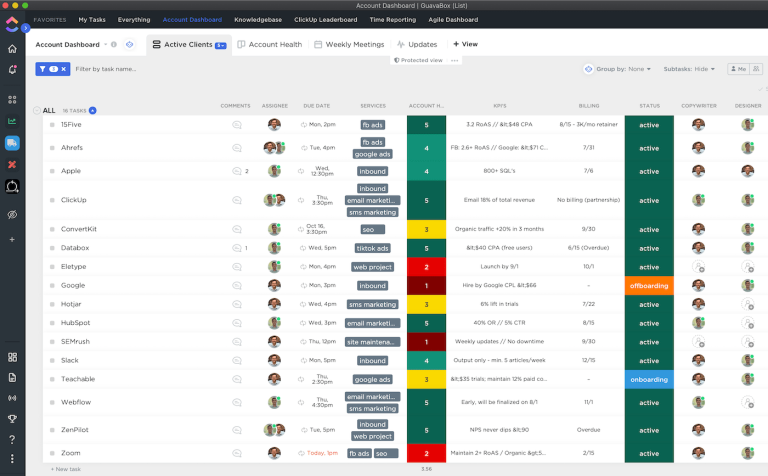
Key Features
- Agile Project Management: ClickUp provides upwards of 15 highly adaptable views, including dashboards and templates, that make it easy to manage projects in a way that aligns with specific workflows.
- Time Management & Collaboration: Core features include task and time management and collaboration tools. Capture and track time from any device and view the work in any of more than a dozen perspectives, including list, Gantt, board, and calendar views.
- Free Access to Premium Features: There is no cost for qualified startups, who can receive up to $3,000 in ClickUp credit with an upgraded enterprise workspace.
Pros & Cons
| Pros | Cons |
|---|---|
| • Robust free plan for smaller teams with more limited budgets • Goal tracking all in one place with timelines to set measurable targets • Detailed time tracking from any device available on all plans • User-friendly interface with multiple views for any workflow • Suitable for the management of complex projects by breaking it down into manageable tasks | • Flexibility can be complex for non-tech users new to PM software • Extensive features might be more suitable for larger startups with complex projects • Customizations may be challenging and time-consuming to set up in a timely manner |
Why We Chose ClickUp
ClickUp presents an ideal solution for startup companies because it seamlessly aligns with their responsibilities, workflows, and goals. ClickUp empowers project managers to streamline operations and drive efficiency in an easy and accessible all-in-one solution.

Asana: Best For Cross-Functional Teamwork
Asana is a project management platform that can help startups enhance project and task management across the entire organization within a unified interface. It provides a well-structured workspace that allows for the examination of project information through various work views, including lists, timelines, and boards.
With Asana, cross-functional teams can create and assign tasks, build plans, customize workflows, and effectively monitor project progress over time.
Read our review of Asana
Asana is a project management platform that offers one of the most impressive free plans for startups, offering accessibility for teams of up to 15 members without time constraints.
With Asana, users from across teams can seamlessly monitor bug tracking, sprint management, as well as strategize and execute campaigns, events, and product launches. The project management platform incorporates integrated messaging, file storage, a versatile workflow builder, unlimited dashboards, custom fields, forms, automation, mobile apps, portfolio management, workload tracking, approval workflows, and proofing tools.
While Asana boasts an extensive array of features, it has a limitation of only being able to assign tasks to a single user, which can be a hurdle in more intricate workflows and larger teams. However, a workaround involves tagging other individuals in tasks. Although not a dealbreaker, the capability for multi-user task assignments would be a valuable enhancement.
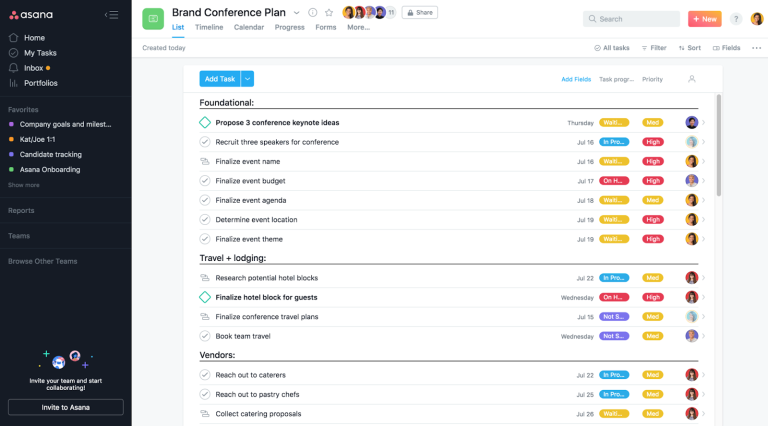
Key Features
- Task Organization: Asana gives teams the ability to effortlessly arrange and prioritize assignments. An interface with multiple views such as lists, calendars, and boards makes it easy for teams to collaborate and work together to check work items off the list.
- Project Planning and Progress Monitoring: Attributes such as timelines, Gantt charts, and task dependencies make it easy for teams to create project plans, effectively allocate resources, and actively monitor progress in real time.
- Ecosystem of Integrations: Asana seamlessly plugs into a variety of third-party tools to help run startup business operations. Integrations with popular tools such as Slack, Google Workspace, and Microsoft Teams directly in the Asana platform make streamlining operations a breeze.
Pros & Cons
| Pros | Cons |
|---|---|
| • Feature-rich free plan without incurring additional cost • Organized work views to help organize tasks and projects • Task tracking and management for multiple teams, tasks, and projects • Dashboards and portfolios offer a consolidated view of tasks and projects • Approval workflows and proofing tools for streamlined processes and collaboration | • Inability to assign a task to multiple team members • Too many email notifications can be distracting and result in some messages being missed • May be hard to use for more complex projects that require additional features |
Why We Chose Asana
Asana emerges as an appealing project management solution tailored for startups aiming to expand. Its diverse set of features not only includes versatile task and project management capabilities, but also collaborative tools and customizable workflows, making it particularly well-suited for cross-functional teams striving for efficient coordination and seamless collaboration.

Freedcamp: Best Free Project Management Software
Freedcamp is an agile project management platform that prioritizes simplicity and flexibility, and is well-designed to support startups’ organizational and collaborative needs.
Freedcamp provides smaller teams with a comprehensive toolkit that includes task management, collaborative communication, file sharing, time tracking, and customizable workflows. The platform’s user-friendly interface and modular framework empower startups to tailor the platform to their distinct demands, boosting project execution and team collaboration.
Freedcamp’s built-in communication tools, including discussions, comments, and file sharing, effectively foster real-time collaboration among team members. The platform offers a high level of flexibility in tailoring workflows to match the unique processes and methodologies of startups.
Moreover, what makes Freedcamp the top choice for free project management software solution is that it has a modular app structure that empowers startups to curate features to their requirements, minimizing additional complexity and ensuring a tailored project management experience.
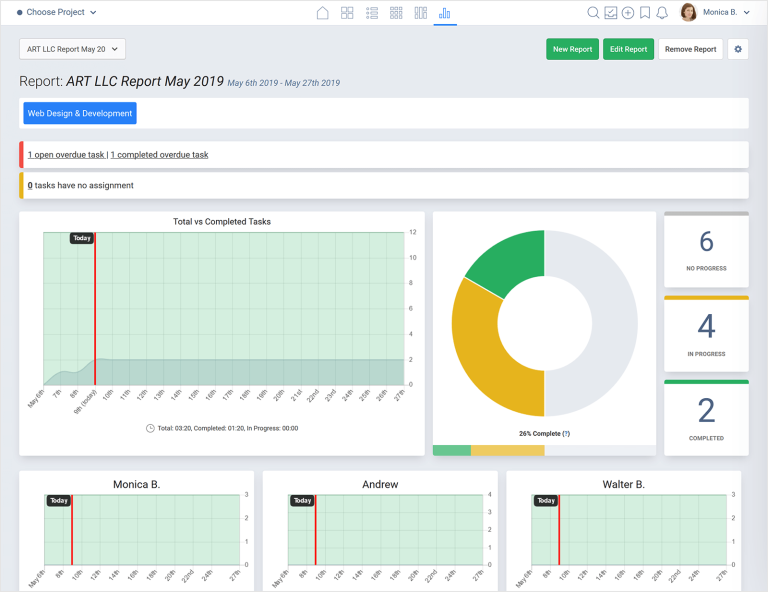
Key Features
- Collaboration and Communication: Freedcamp’s intuitive interface includes shared calendars, discussion boards, and real-time messaging collaboration capabilities to power teams to communicate and share updates regardless of their location.
- Custom Workflows: Create, assign, and track tasks through well-defined custom workflows that allow for task dependencies and recurring tasks throughout all stages of a project’s development.
- Document Management and Cloud Storage: Utilize a centralized space for documents with features like file versioning, sharing, and integrations with secure cloud storage services you already use.
Pros & Cons
| Pros | Cons |
|---|---|
| • Robust free plan with essential features for any individual team looking to get started • Unlimited file storage, collaborators and users (on paid plans) • Modular app structure with select features for flexibility and customization in tailoring the project management experience • Real-time notifications to keep teams in-the-know even on the go • Synchronization with Google Calendar for scheduling and reliable collaboration and planning efforts across resources | • Unremarkable interface may make it difficult for users to find what they are looking for at a glance • Complicated navigation when using complex or advanced features • Lack of support for complex projects for startups needing a more specialized project management experience |
Why We Chose Freedcamp
We think that project managers at startups should seriously consider Freedcamp. Its feature-rich free plan, encompassing robust capabilities for task management, communication, file sharing, and customization, empowers project managers to smoothly execute projects, making it an ideal choice for high-performance teams.

Trello: Best for Kanban Boards
Trello is a streamlined project management solution designed to optimize workflows. Its intuitive interface and visual boards give startups the power to efficiently organize tasks, collaborate in real-time, and monitor progress effortlessly. Trello’s customizable cards, integrations, and straightforward approach position it as a prime option for startups seeking improved coordination, communication, and productivity across their projects.
Read our review of Trello
Within Trello’s framework, teams can effortlessly visualize tasks and projects, enhancing progress monitoring and workload management through a visual approach. The card customization feature empowers users to tailor task specifics and due dates, ensuring alignment with their distinctive workflows.
Trello’s real-time collaboration features bolster teamwork by enabling seamless communication through comments and attachments, improving efficiency and productivity. Furthermore, Trello’s excellent integration capabilities allow organizations to seamlessly link with external tools, helping to create a unified workflow that simplifies processes and curtails the need to switch between multiple applications.

Key Features
- Visual Task Organization Using Boards: Projects are organized into boards, lists, and cards. This system allows organizations to create boards for different projects, lists to represent project stages, and cards to represent individual tasks to see and follow progress at a glance.
- Tailored Workflow Flexibility: The flexibility to design workflows and align with processes is built into Trello. Teams can customize lists, labels, and card categories to match their project management needs for varying project types and team structures.
- Enhanced Collaboration and Communication: Features like card commenting, attachments, and mentions enable users to discuss tasks, share documents, and tag team members directly within cards, staying connected without interruption.
Pros & Cons
| Pros | Cons |
|---|---|
| • Visual boards that help organize and progress work items and tasks in a visual representation that any user can comprehend • Customizable cards are adaptable for tailored workflows to exactly match operational processes • User-friendly interface is intuitive, with drag-and-drop functionality and simple navigation for both experienced and new users • Scalable solution for growing needs to accommodate increasing project complexity and team size • Real-time collaboration and communication among team members regardless of physical location | • Narrow scope for general project management may limit suitability for complex or specialized project needs • Limited customization options may not provide the depth of customization certain startups require • Privacy and security are light with default settings that may not be in compliance with or meet strict data protection requirements |
Why We Chose Trello
Startup leaders should seriously consider embracing Trello. With its inventive kanban boards and card-centric structure, Trello offers an intuitive and user-friendly platform for visualizing tasks and projects, supporting enhanced coordination, communication, and productivity within the dynamic startup environment.

ProofHub: Best for Collaboration
ProofHub is a powerful project management solution that’s perfect for startups pursuing efficient collaboration and organization. Its extensive feature set encompasses task management, team communication, time tracking, and document sharing, equipping startups with a centralized platform for enhanced project execution and team alignment.
Notably user-friendly with a focus on simplicity, ProofHub’s customizable workflows position the platform as an ideal choice for startups seeking effective project management tools to bolster their growth trajectory.
Read our review of ProofHub
ProofHub’s task management functionality empowers startups to visualize tasks across various stages, improving workflow management and progress-tracking capabilities. The seamless integration of chat and discussion tools within the platform fosters real-time communication among team members, fueling effective collaboration within projects.
Additionally, ProofHub’s time-tracking features enable startups to meticulously track work hours, allocate resources appropriately, and generate insightful reports, enhancing project planning and resource management.
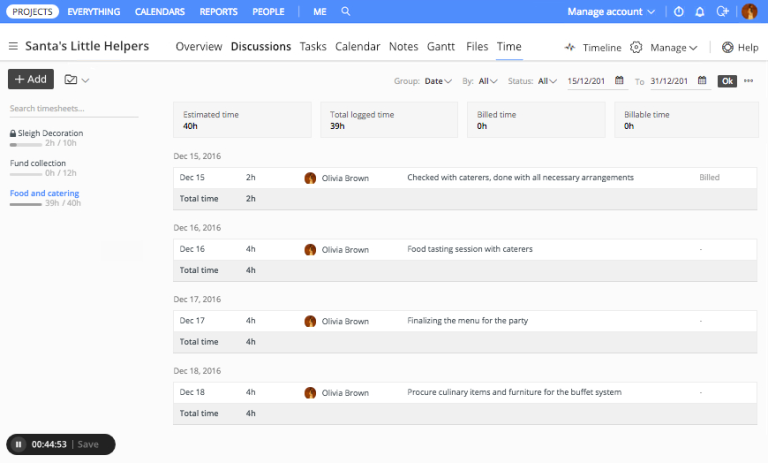
Key Features
- Task and Project Management: ProofHub allows teams to create, assign, and track tasks within projects. This feature facilitates efficient task allocation, real-time monitoring of progress, and clear visibility into project timelines.
- Collaboration and Communication: ProofHub supports an array of collaboration and communication tools including discussions, note-taking, and file sharing. These tools make it easy for teams to exchange ideas and share project-related information via a centralized platform, eliminating the need for multiple communication channels.
- Gantt Charts and Timelines: The integration of Gantt charts and visual timelines provides startups with a concise perspective of project schedules, task interdependencies, and resource allocation. Strategic planning, identifying issues, and aligning with deadlines are made easier with this functionality.
Pros & Cons
| Pros | Cons |
|---|---|
| • Focused kanban boards for task visualization to ensure projects stay on task • Built-in chat and discussion tools for real-time communication fuels information exchange across teams • Seamless centralized document sharing based on a single repository for all project-related files • Customizable workspaces for different projects with varying requirements | • Cloud-based with dependency on internet connectivity makes it difficult to work offline • Costly pricing tiers for rapidly growing teams may be above budget Integration limitations • Limited advanced reporting and analytics for complex work that startups may need to analyze closely |
Why We Chose ProofHub
Opting for ProofHub as a project management solution holds strong appeal for startups. With an array of collaborative tools including kanban boards, integrated communication, and centralized document sharing, ProofHub delivers a holistic and efficient solution, empowering startups to enhance teamwork, optimize workflows, and accelerate project delivery.
Bottom Line: The Best Overall Pick
After careful evaluation, ClickUp stands out as the top choice for project management, suitable for startups and teams of all sizes. It checks all the boxes for fledgling organizations with growth and great work in mind.
With its robust feature set, adaptable workflows, user-friendly design, and cost-effectiveness, ClickUp presents a holistic solution for optimizing project execution, fostering collaboration, and facilitating startup growth. Its free trial allows businesses to try out the platform before moving to a paid plan, making it ideal for a range of industries and for young companies anticipating dynamic business growth and evolution.
Methodology
FAQs
Professionals at startup companies can ask the following questions when shopping for project management software that fits well with their business and team structure:
